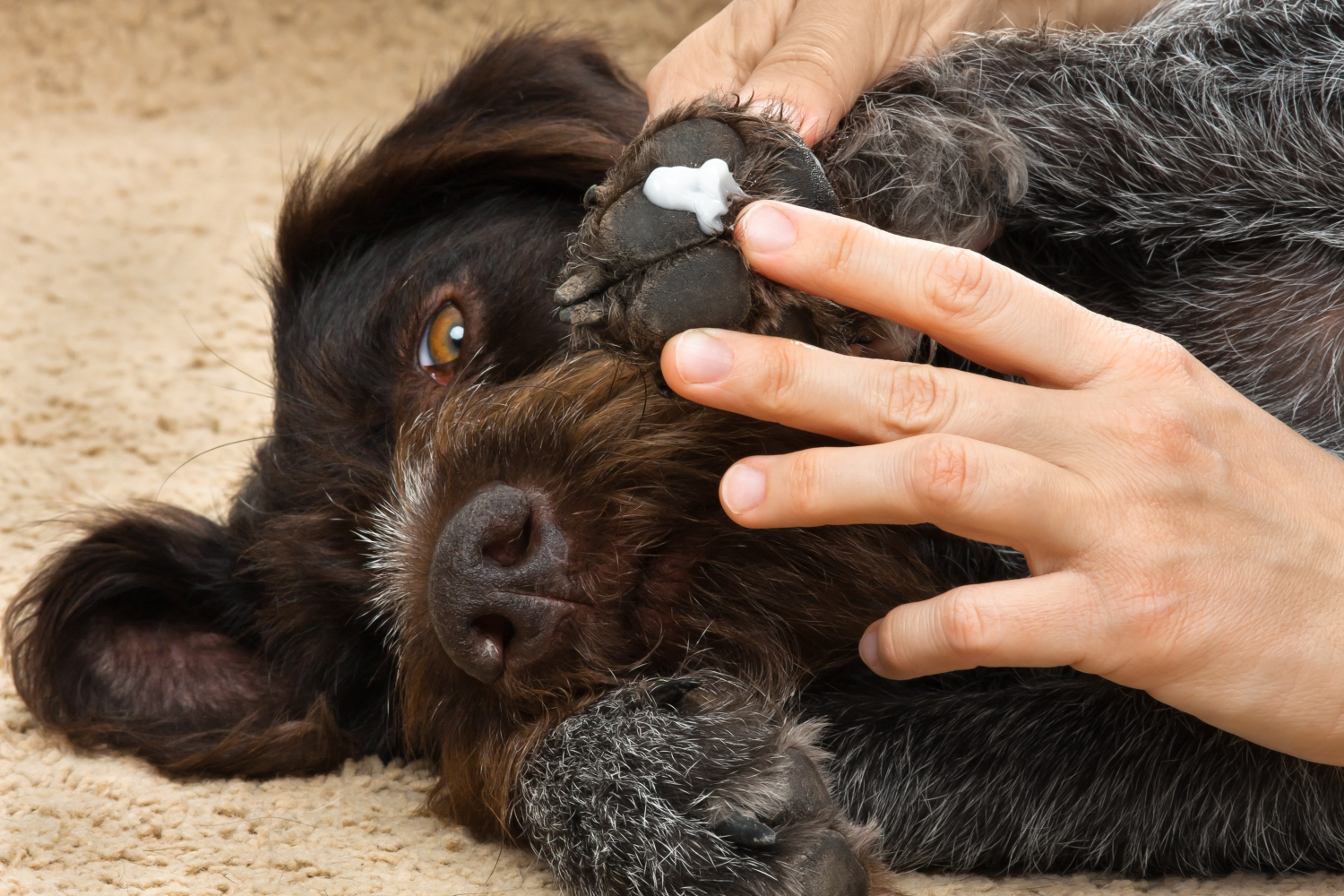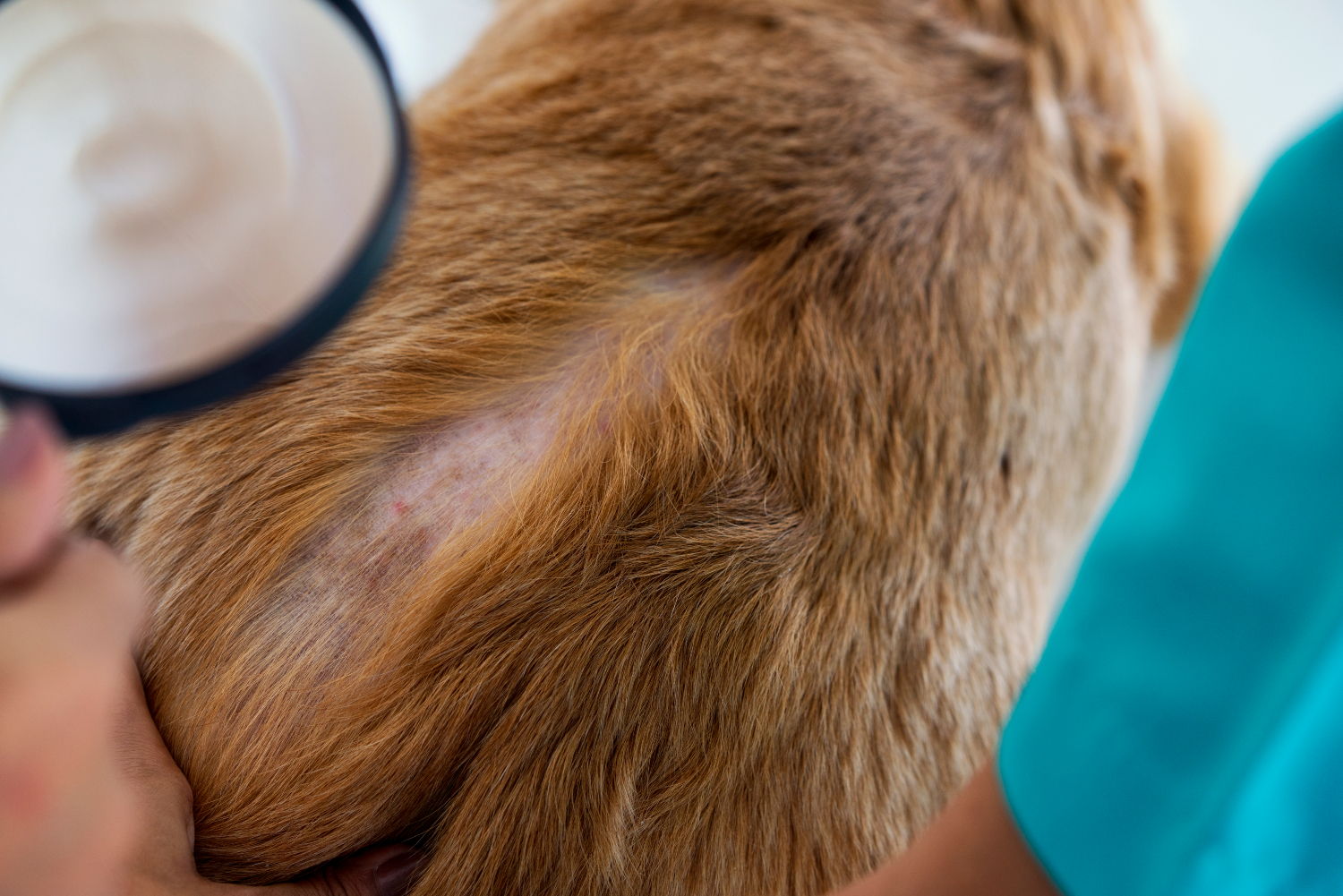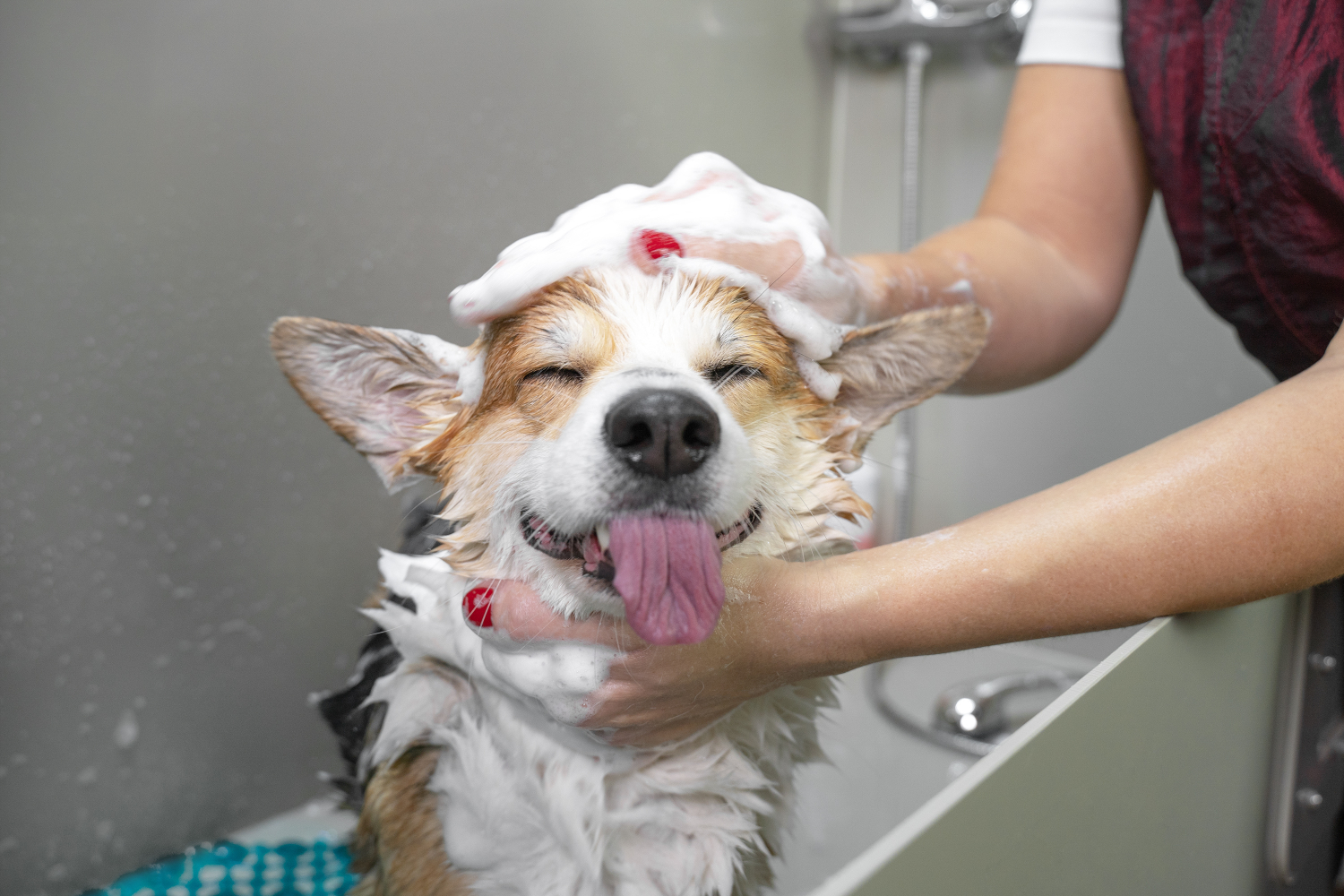
Dry skin in older dogs
26th January, 2023
Have you noticed your senior dog itching a lot? Do they appear to have dandruff? Discover why old canines get dry skin and what you can do to help with these tips from Petwise.
As dogs age, they’re much more likely to experience a range of health problems, one being dry skin. Although the condition can make your pooch uncomfortable and cause them to itch a lot, scaly skin itself is usually not too difficult to treat.
However, sometimes there might be a more serious underlying cause for their flaky dermal layer, so it’s always worth checking with a professional.
Depending on the cause of your dog’s dry skin, treatment costs and regular vet visits can all add up, so it’s vital you protect your ageing hound with pet insurance for older dogs.
Lifetime cover for your dog means they can get the medical attention they need when they need it most, and you don’t have to worry about the financial pressures of seeking a vet for help, as insurance helps to alleviate this problem.
So, why is your four-legged friend’s skin getting dry, and what can you do to make it better? Discover the symptoms, causes, and best ways to treat the condition below.
What are the symptoms of dry skin in older dogs?
Even if your senior dog has been itching but doesn’t have flaky skin, it could still mean it’s dry. There are various symptoms of the condition, and not every canine shows the same signs.
All of the following are associated with dry skin, and your hound might display only one or a select few:
- Flaking
- Scaling
- Dandruff
- Itching
- Scabs
- Redness
- Hair loss
- Pimples
- Increased oiliness
- Odour
When you notice any of these symptoms, tell your vet. Keep an eye on your canine’s behaviour to see if you notice anything else out of the ordinary, as this could hint at an underlying health issue that needs further care and treatment.
Don’t forget to protect your four-legged family member with pet insurance for older dogs to help pay for emergency care when they really need it.
Why has my old dog got dry skin?
There’s no straightforward answer to this question. There are many reasons why your hound’s skin might have become dry in their senior years:
- They have a parasite
- They are allergic to something
- You’re bathing them too much
- The soap is too harsh for their skin
- They have an infection
- They have a hormonal or autoimmune disorder
- Their breed is predisposed to dry skin
- They have a poor diet
- They can’t groom themselves properly
- The weather is very cold and dry
In most cases, you can care for the dry skin at home with directions from your vet, but many of the underlying causes will also need to be treated to prevent the issue from returning.
Pet insurance for older dogs can help you financially with treatment in those sudden and unexpected situations, which is why it’s so important to protect your canine companion through every stage of their life.
If you have pet insurance for older dogs through Petwise, you can also take advantage of 24/7 vet video calls.
Below, we take a closer look at each of the reasons for dry skin and what other symptoms to look out for.
Parasites
There are a range of tiny parasites that can do a lot of damage to your pet’s dermal layer. If your dog has mange with dry and flaky skin, it might be due to:
- Demodex mite
- Cheyletiellosis (Walking Dandruff)
- Canine scabies
Your senior canine might also have lice, causing them to scratch like crazy, which leads to hair loss and sores.
If your dog is excessively itchy, you need to get them seen by a vet. You will get treatment to get rid of the parasite and directions on how to treat the dry skin. If your pet’s skin condition is severe, you might get referred to a dermatological specialist.
Allergies
It’s not only us humans who get allergies – our canine companions do, too! Dogs can experience allergies due to:
- Food
- Pollen
- Dust
- Grass
- Feathers
- Flea saliva
- Animal dander
All the above can cause a variety of symptoms in your four-legged friend, including dry skin. If the allergies go untreated, they can lead to the skin condition atopic dermatitis, which causes your elderly canine to develop:
- Itchiness
- Redness
- Inflammation
- Secondary skin infections
Excessive bathing
You might be tempted to give your dog a bath as often as you shower, but it’s bad for their skin. The Blue Cross mentions that canines are best left without being bathed for as long as possible.
Overbathing leads to a dry coat and skin, causing dandruff build-up and a lot of discomfort to your senior pooch.
Dogs have natural oils in their coat that clean the fur without you interfering. The only time you really need to get them in the tub is when they get very dirty or roll in something smelly.
Harsh soap
Just like with bathing too much, the soap you use could also be doing more harm than good. Dog shampoos are readily available at vets, pet shops, and online, which are specially formulated for their delicate skin.
Human shampoos can make your hound’s skin very dry, and those with added colours or fragrances are particularly harsh.
If you find your old dog has got into a mess and needs a quick bath but you don’t have doggy soap to hand, baby shampoo is the next best thing. This should only be a last resort, though, and we recommend buying a canine product as soon as .
Infections

Certain bacterial and fungal infections can create a host of skin issues in your canine, and may be the result of a larger, underlying health problem, like ringworm, which the CDC can also transfer to humans.
Your pet should always be seen by the vet for dry skin to rule out conditions like this. Your veterinarian will need to take a skin scrape for cytology to diagnose the issue.
Make sure your pooch is covered with pet insurance for older dogs to help you cover all the costs of care and treatment.
Systemic disorders
Your pet’s dry skin could signal a much bigger problem than those mentioned above, which is why it’s always important to take them to the vet when you spot any of the signs.
Hypothyroidism and Cushing’s disease are the two most common metabolic diseases that cause dry skin, and both are usually accompanied by:
- Hair loss
- Brittle hair
- Skin infections
Dry skin can also signal auto-immune diseases, like cancer. All of these conditions are very serious, so the sooner you take your senior dog to the vet, the sooner they can get the care they need.
Their breed
Like with most health issues, certain breeds are more prone to them than others, and it’s the same with dry skin.
Hairless breeds, like the Chinese Crested and Peruvian Inca Orchid, are predisposed to a variety of skin conditions because they aren’t protected by a layer of fur.
Alaskan Malamutes, Siberian Huskies, and other fast-growing breeds can also suffer from a condition called zinc-responsive dermatosis, which dries their skin out and causes:
- Hair loss
- Scaling around the mouth, eyes, and ears
- Red lesions
- Itchiness
- Skin infections
Although these breeds are more likely to experience dry skin, it’s possible for any canine to get the condition. This is why it’s important to have pet insurance for older dogs, whatever breed you own, in case they need emergency care and treatment.
Poor nutrition
One of the best ways to make sure your senior pooch is in good health is with a healthy, balanced diet. Poor nutrition is a common reason for dry skin and is a result of nutrient deficiencies, like not getting enough vitamin A or C.
As dogs age, it’s common for them to lose their appetite, so it’s important you speak to your vet about a calorie-dense diet for your elderly hound.
If you have pet insurance for older dogs with Petwise, you can use our 24-hour vet video service for professional advice about feeding your canine companion.
Lack of grooming
All dogs lick themselves as a natural way of cleaning, which helps stop their skin from drying out. As you might imagine, canines need to be quite flexible to be able to groom every part of their body.
This is why certain conditions that arise as they age can make it more difficult to lick all over, leading to dry skin. If you’ve noticed your elderly pet is a little smellier than usual and doesn’t seem to be grooming like they once did, they might be suffering from:
- Arthritis
- Being overweight
- Pain or stiffness
Dry and cold climate
When temperatures drop and humidity is low, the dry air sucks moisture from our skin, and it’s the same for dogs. You might notice dry skin on your older pooch during winter, which is why it’s important to keep their skin clean and moisturised.
Here are a few ways to help your pet’s skin retain as much moisture as possible:
- Use a humidifier in your home.
- Give your senior hound an Omega 3 and Omega 6 fatty acid supplement.
- Bathe them with an oatmeal-based shampoo.
- Rub coconut oil into their coat.
Don’t forget to take them to the vet for a check-up and to make sure the dryness isn’t a symptom of something more serious.
How to treat dry skin in older dogs
Due to the numerous causes of dry skin, there are many ways it can be treated, too. The first step to helping your old dog get better is to take them to the vet for a diagnosis.
Causes like over-bathing, harsh shampoo, and a bad diet are easier to treat and usually involve a small change to your dog’s normal care routine.
When dry skin is a symptom of a much larger cause, your four-legged friend will need treatment, usually medicine, for the condition as well as their skin.
There are no cures for environmental allergies, so the best way to help your dog feel more comfortable is to avoid the allergy and control dry skin with the moisturising methods mentioned above.
If your vet suspects your canine companion has a food allergy, they will start them on an elimination diet. You will need to remove certain foods from your dog’s meals and see if symptoms improve.
If you have more questions about your hound regarding dry skin and have pet insurance for older dogs with Petwise, you can use our 24/7 vet video service for advice.
Can I prevent dry skin on my senior dog?
To avoid your four-legged family member suffering from dry skin and you and your vet trying to treat it, you could do your best to prevent it in the first place.
Although certain dogs are more prone to a flaky dermal layer, there are a few things you can try to stop it from appearing:
- Feed a calorie-dense, high-quality diet.
- Stay up-to-date with parasite treatments to prevent them.
- Provide supplements that help keep the coat and skin healthy.
- Groom often to stop debris and dirt from building up.
- Wash their coat with a dog shampoo made for dry skin.
- Learn more about your dog’s breed and what skin conditions they are prone to.
- Take your dog for regular vet checks to monitor their health.
As your pooch gets older, you need to look out for them more, as they are more likely to develop health conditions than when they were young.
Being a responsible pet parent and taking them for regular check-ups is the best way to prevent dry skin and other issues from arising.
Vet visits for non-emergency check-ups and treatment aren’t covered by pet insurance for older dogs but are an essential part of budgeting for your canine companion’s care.
How to bathe your senior dog
We’ve already mentioned how bathing too often can dry out a dog’s skin. Add harsh soap to the mix, and your old pooch will be scratching non-stop.
Only bathing when they are dirty and using the right products are essential to keeping your hound’s coat and skin moisturised and itch-free.
It might seem simple to dunk them in the bath, lather on the shampoo, and quickly wash it off, but there are a few steps you need to take to make sure their skin doesn’t end up flaky and itchy afterwards.
Here are some tips to pamper your pooch properly at bath time.
- Understand their coat type: There are different shampoos and conditioners for different fur, so speak to your vet about what suits your dog’s coat.
- Provide plenty of love: Some canine companions fear getting in the bath, so make sure yours feels comfortable with lots of cuddles and treats throughout the process.
- Use lukewarm water: Dogs are sensitive to heat, so even though you might like a scalding hot shower, it can be unpleasant for them. Water that’s too hot also dries the skin out more.
- Gently lather in the shampoo: As you rub the products in softly, move your hands in the same direction as their fur grows.
- Be careful of the face: Only use a warm, wet washcloth around your pet’s head and face to avoid damage.
- Rinse properly: Make sure you thoroughly rinse all the shampoo. Any left behind can create dandruff and cause a lot of itching.
- Don’t forget to condition: Shampoo strips your dog’s coat and skin of moisture, so it’s essential you use a conditioner to stop it from drying out. Make sure you thoroughly rinse it all off like with the shampoo.
- Dry your senior dog with care: Hair dryers might frighten your pet, so if you want to use one, put it on the lowest setting and move in the direction that the coat grows in. Otherwise, you can gently wrap your canine in a towel and pat them dry.
When bath time is done correctly, it can be a wonderful experience for both you and your older four-legged friend.
It’s a great chance to grow your bond and can be very relaxing to your ageing pet, especially on tired joints and muscles. Most importantly, you must make sure your dog feels comfortable and happy by taking it slowly and being gentle.
Best products to help dry skin on older dogs
If your ageing hound is suffering from dry skin and you want something to help keep it moisturised, there are products you can use. Try the following to maintain a ‘pawfect’ coat and skin in your dog:
- Pro Pooch Oatmeal Dog Shampoo (£9.99 from Amazon) – This oatmeal-based shampoo soothes itching and is very effective on dandruff.
- Vet’s Best Dog Hot Spot Itch Relief Spray (£10.49 from Amazon) – This spray gives your pooch almost instant relief from itching and is great for seasonal allergies.
- Pets Purest Scottish Salmon Oil (£11.99 from Amazon) – You can easily add this oil to your pet’s meals to boost a soft coat and itch-free skin.
- Natural Dog Company Skin Soother (£6.99 from Amazon) – This organic balm soothes itching and redness and can be applied up to three times a day.
- TropiClean Dog Conditioner (£7.99 from Amazon) – This amazing smelling conditioner moisturises your canine’s coat and skin to help prevent dryness.
Look out for your senior dog with pet insurance

Dry skin is just one of many conditions your ageing friend might suffer from, which is why it’s important to protect them through their senior years.
With pet insurance for older dogs in place, you can make sure your canine companion gets emergency care and treatment when they need it most, without worrying about paying for a large vet bill.
Why choose Petwise to cover your senior dog? You get a range of benefits to give your older pet the protection they deserve during their golden years, including:
- Dental cover as standard*
- No upper joining age limit
- Payments made direct to your vet
- A senior food contribution
- 5* Defaqto rated products
- Access to 24/7 vet video calls
Don’t wait any longer to protect your ageing pooch. Get pet insurance for older dogs from Petwise today.
*Subject to T&C’s